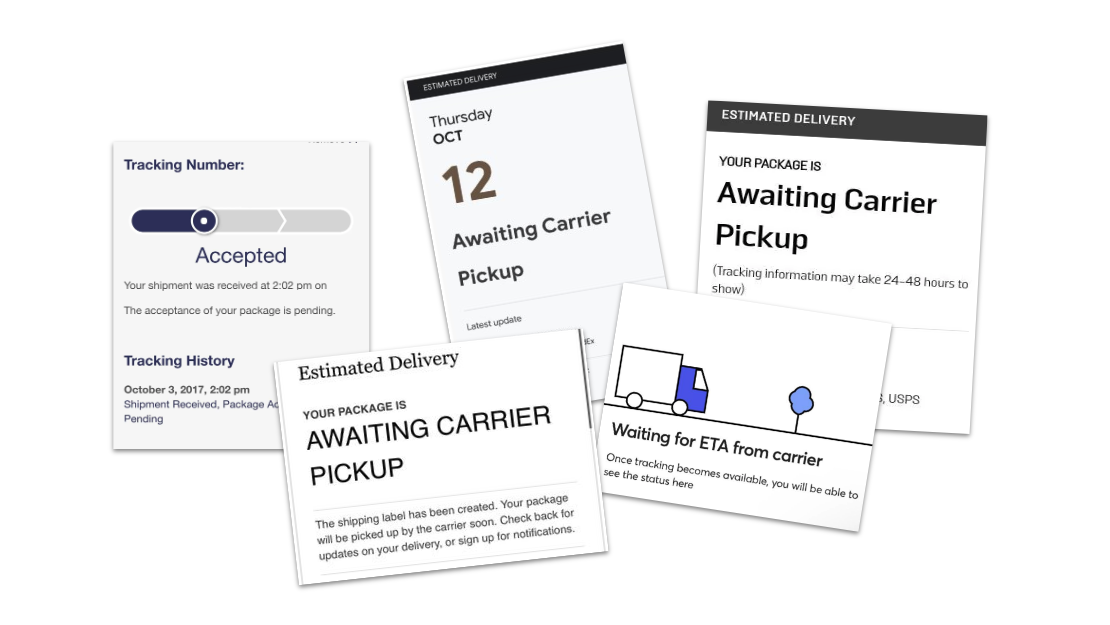In e-commerce, every second counts.
Customer satisfaction hinges on more than just the quality of the products purchased; it's also deeply influenced by the efficiency and reliability of the delivery process.
One crucial aspect that can make or break this experience is dwell time—the often overlooked interval that could be silently eroding your brand's reputation and customer satisfaction levels.
Although not often talked about outside logistics circles, dwell time, and actually your Past Dwell Time Frequency is a critical metric that can significantly impact your performance – and how it's perceived.
This post dives into the intricacies of dwell time, its effects on any e-commerce or DTC brand, and how Stord is leading the charge in mitigating this challenge, ensuring a seamless customer experience from click to delivery.
The Dwell Time Dilemma
“If you’re not measuring it, you’re not managing it.”
For those unfamiliar, dwell time refers to the gap between a 3PL or fulfillment provider’s marking an order as “shipped,” and the moment a shipping carrier actually scans the package into its system and truly begins to move the package.

This seemingly minor lag can significantly impact customer experience, creating a ripple effect that extends far beyond delayed deliveries.
In essence, it's the waiting period from when your parcel is just sitting there, not getting any closer to your doorstep to when it’s actually on its way.
Doug King, Stord’s VP of Transportation, emphasizes the importance of minimizing this lag to keep up with customer expectations:
“The problem faced by e-commerce brands today isn't just about shipping speed; it's the unpredictability and inconsistency introduced by excessive dwell time.
When customers hit 'purchase,' they're not just buying a product; they're buying an experience — one that includes a swift and smooth delivery process.”
For e-commerce brands and direct-to-consumer (DTC) leaders, managing dwell time is not just about avoiding delays; it's about ensuring a seamless, positive customer experience from checkout to delivery.
It’s important to note that there’s always some dwell time; it’s to be expected and not a problem. For example, parcel carriers normally sort and scan only in the evenings, and with a few exceptions only on weekdays.
But excessive dwell time – and the frequency that your packages exceed the expected dwell time – not only signals potential inefficiencies in your supply chain but also jeopardizes the delicate trust that you’re striving to build with your customers.
What Causes Excess Dwell Time?
Several factors contribute to excessive dwell time, each affecting the speed at which products move from warehouses to the end customer.
This problem can stem from a variety of sources, notably delays in carrier pickup, which is often the result of the carrier not taking physical possession of the package quickly after its status is marked as shipped.
But it’s not that simple.
Such a scenario typically occurs when a package, despite the order being picked, packed and and declared ready for shipment with its label printed, remains in the fulfillment providers facility and/or on the shipper's dock awaiting carrier pickup and transportation. Some shippers might even simply print the label and not even pick and pack for a day or more!

This initial delay can be compounded by
miscommunication between the shipper and the carrier,
missed pickups,
or even packages being misplaced during the sorting and transit process.
3PL or shippers might declare orders as “shipped” prematurely to avoid cancellations, even though the package is not yet in the carrier's possession. This misalignment causes gaps in the tracking and actual shipment progress.
These inefficiencies not only slow down the delivery process but can also lead to customer dissatisfaction and increased costs for the e-commerce brand.
Further contributing to the challenge of managing dwell time is the handling and operational processes within the fulfillment centers or third-party logistics providers (3PLs) themselves.
For example, inefficient processes following pick/pack steps such as
improper sorting,
labeling, or
loading packages onto the incorrect carrier vehicle
can significantly delay the movement and scanning of packages.
Misplaced packages, either by the 3PL or even the delivery carrier can add further delays if not efficiently identified and remedied.
And in some cases, for smaller shippers or 3PLs, they may be constrained by pickup schedules.
As Doug highlights: “if you’re trying to ship on your own, carriers might say,
‘Hey, we’re only going to come out every two days to pick up from you. There’s not enough volume there to justify me sending out a truck.’
That’s not an uncommon thing to hear from a carrier.”
Do Dwell on Tracking
Additionally, a lack of advanced technology and infrastructure for tracking package movements from the moment an order is placed until its delivery exacerbates dwell time issues.
The absence of real-time monitoring and exception reporting mechanisms hampers the ability of e-commerce/DTC brands to proactively identify excessive dwell times, address delays, and ensure that orders are delivered to customers promptly.
The Impact of Ignoring Dwell Time
The stakes are high, and the impact of ignoring dwell time is significant.
When packages languish due to extended dwell times, the immediate consequence is, of course, delayed deliveries. However, often the underlying issues run deeper, hinting at systemic problems within the supply chain that could disrupt operations and tarnish brand reputation.
Customers today expect quick, reliable service. A failure to meet these expectations can lead to dissatisfaction, negative reviews, and ultimately, a decline in loyalty and repeat business. In the hyper-competitive e-commerce landscape, these are setbacks that brands can ill afford.
Bottom line: whom can you trust?
Your fulfillment partner or 3PL? (“Don’t ask me; talk to the carrier”) Your carrier? (“Don’t ask me; I don’t have the package yet!”)
Even If you’ve been given a tracking number and told that your package is on the way, how can you be so sure?
Stord's Solution to Dwell Time
At Stord, we actively manage your “Dwell” time, all the way through the carrier scan (and through delivery), to make sure we deliver on your promise.
Leveraging modern technology, Stord has developed a comprehensive strategy to track and manage dwell time from order through delivery.
Our technology-driven solution is designed to tackle dwell time head-on.
By implementing a sophisticated tracking system that monitors packages from the moment an order is declared shipped through to delivery, Stord aims to keep dwell time occurrences well below what we typically find our customers have experienced.
This approach is rooted in exception management; by identifying when dwell time exceeds normal levels, Stord can swiftly address and rectify any underlying issues in the supply chain.
This proactive stance ensures that the frequency of packages experiencing excessive dwell time is kept to a minimum, maintaining the integrity of the delivery process and, by extension, customer trust.
Importantly, our focus on exception management lets us learn from each instance to prevent future occurrences, continually driving down your Past Dwell Time Frequency.
An Exception to What Your Existing 3PL Does with Your Package
Unlike other fulfillment vendors and 3PLs, Stord:
Monitors dwell time meticulously to ensure packages are not delayed in the shipping process, and
Maintains consistent communication with carriers to ensure packages are transported in a timely manner.
Stord has built a detailed tracking infrastructure to monitor packages at every transit stage that
Detects packages that have not been scanned by the carrier by a specified deadline, facilitating prompt problem resolution, and
Allows for a swift response when packages don’t get scanned by the carrier by the deadline, identifying exceptions in real-time and ensuring the overall reduction in delivery times.
Having such a system with underlying tech in place in your fulfillment operation is crucial. Without such an approach powered by an underlying tracking system, brands face two specific problems:
Lack of Visibility: Many brands don’t even know that dwell time is something to be tracked, or get no visibility into from whoever is responsible for their fulfillment.
No Tracking Capability: Whether you’re doing your own fulfillment or relying on a 3PL, you’ll likely find that there’s no systematic tracking of your Past Dwell Time Frequency. Without knowing every time a package has exceeded the expected dwell time, there’s no way to immediately remedy the situation and get the package on its way. That leads to completely unnecessary increased delivery times, harming consumer experience and your brand reputation.
In these cases, brands typically experience past dwell time frequency from 10-30%! That means in almost a third of their orders, there’s some problem in getting their packages moving in the expected time frame – and they have no idea there’s a problem.
In the best case, the situation resolves itself, and order delivery is delayed one-to-two days. In other cases, there may be no awareness of an issue until an unhappy customer reaches out with a WISMO request, and at this point, the journey to find out that the order (along with others) is sitting in a gaylord container somewhere in the fulfillment center or lost in a carrier’s truck.
Stord’s proactive approach ensures that packages are handed off to shipping carriers efficiently, and exceptions (i.e., packages not with the carrier when expected) are rapidly identified – keeping your fulfillment process smooth and customer satisfaction high.
Dwell on the Positive Benefits
By effectively managing dwell time, Stord not only enhances delivery performance but also elevates the overall customer experience. This leads to increased customer loyalty, repeat business, and a positive brand reputation.
In an era where online reviews can significantly influence purchasing decisions, maintaining a record of timely deliveries can set a brand apart. This reliability becomes a unique selling proposition, attracting new customers and retaining existing ones.
The benefits that leading e-commerce and DTC brands see from this approach include:
Improved customer satisfaction, due to reduced delivery times.
Increased efficiency in the shipping process.
Greater accountability for both the company and the carriers, reducing blame shifting and improving problem resolution times.
Enhanced reputation with customers due to the expectation and delivery of timely shipping.
Ability to spot and solve potential carrier issues swiftly, preventing a significant build-up of unshipped packages.
Ensuring Fast Delivery and Improved Consumer Experience
For e-commerce brands looking to improve their logistics operations, focusing on dwell time is a crucial step. Partnering with a forward-thinking logistics provider like Stord can help you overcome this challenge, ensuring your products reach your customers quickly and reliably.
It's not just about moving packages; it's about moving your brand forward.
While dwell time may seem like a small piece of the logistics puzzle, its impact on your customers’ experience and brand loyalty is undeniable. With Stord, e-commerce/DTC brands have a powerful ally in their quest to deliver excellence. Remember, in e-commerce, time is not just money—it's everything.
By prioritizing the efficient movement of packages and maintaining open lines of communication with customers, businesses can not only mitigate the challenges posed by excessive dwell time but also enhance their overall competitiveness in the e-commerce space.
Apart from tackling dwell time, Stord also addresses other critical pain points you likely experience in your fulfillment process, such as ensuring inventory control and invoicing accuracy, through specialized team efforts.







